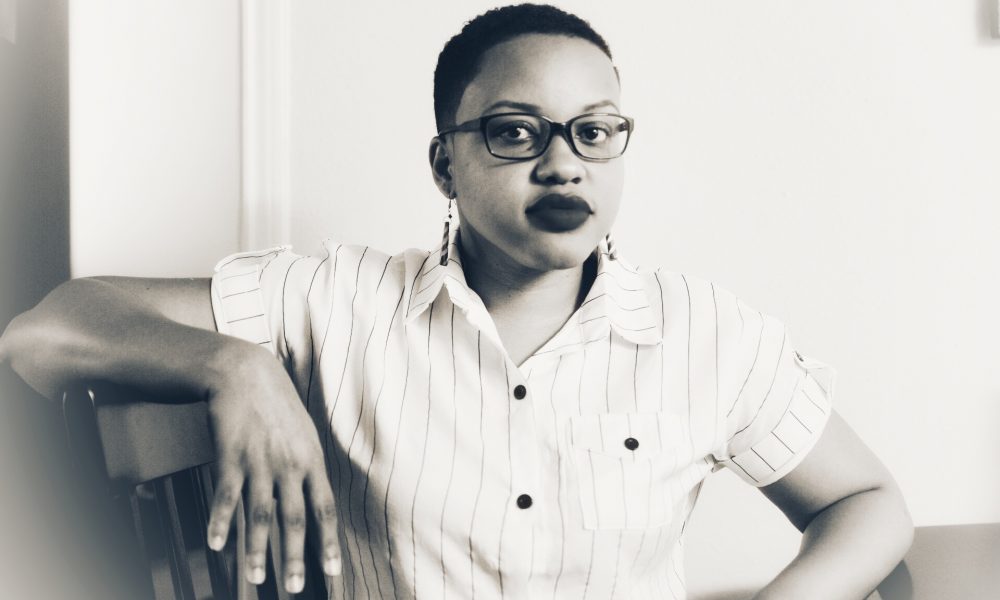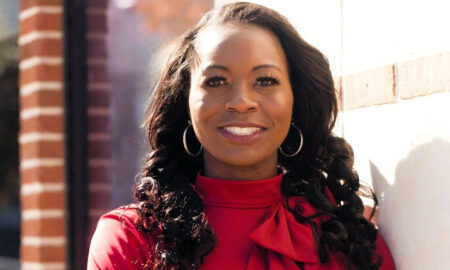

Today we’d like to introduce you to Lois Marshall Barker.
Lois, before we jump into specific questions about the business, why don’t you give us some details about you and your story.
In the spirit of the musical legend, Bob Marley, I consider myself a small ax, sharpened to cut big trees down. I grew up in a family of readers, and people determined to beat the odds. Both my parents were pulled out of middle school to work and take care of siblings. My father, not quite sure of his pathway, knew at eight years old, fieldwork was not it. My mother always had a heart for others, and so nursing seemed to be the road she wanted to travel. But at ten, her mother had different plans for her—this was not uncommon for children of her era. My parents never stopped learning. With only a middle school education, they started and successfully ran three family businesses. With only a middle school education, both of them understood the value of reading and allowing their children to invest in their passions.
Their sacrifices and drive shaped me never to settle, never stay silent, and never stop. My mother said that I was destined to be an educator, despite the traditional West Indian parents’ desire to have their children become lawyers and doctors. I did not host tea parties as a child. Instead, I facilitated writing workshops and book clubs with Barbies, Cabbage Patch Dolls, and Care Bears lined up in front of my bedroom door turned chalkboard, with white chalk, and yardstick in hand. My mother had a rule- for every toy, there must be three books; for every trip to the playground, there must be a trip or two to the library. Reading, she said, made you smarter. Reading, she said, took you to places my pastry hustle money could not take me. So when I became a teacher taking on this traditional role of gatekeeper and knight of the canon was never one of my ambitions.
I wanted to fight for my students to read whatever they wanted. I wanted my students to learn outside of state assessments–that poorly written TAKS test that determined how society would accept them-this is what I call academic malpractice. Fighting for others did not kick in when I became an ELAR teacher at Franklin D. Roosevelt High School in Oakcliff. This fight started in middle school. I grew up in Grenada, a small southern Caribbean country. My schooling there was fun, rigorous, and very hands-on. My teachers were very structured and knowledgeable, strict, yet fun. You had to keep up. When some of my friends started falling behind, my home verandah became a second classroom. I fought again for classmates during my second year in high school when social studies assessment scores began to drop. Every morning thirty minutes before school, I led a study group for anyone failing. My teacher was impressed and starting sharing her plans with me so I could provide remediation and preview upcoming materials.
Let’s take the fight back to the classroom. I taught for six years at Roosevelt High School. At the time, I had not yet discovered Dr. Rudine Sims Bishop and her work around diversity in reading. Dr. Sims Bishop stated that literature should serve as mirrors, windows, and sliding glass doors so readers can see themselves in stories and learn about the lives of others as literature reflects life. For six years, I tried to introduce my students to texts outside of that toxic inner city, gang narrative that so many of them grew sick and tired of reading. I shared my culture with them, as many of them had never traveled outside of the Dallas metro area. I exposed them to West Indian stories about the Nutmeg Princess and jumbies, and poets like Derek Walcott. I tapped into their family’s culture and stepped into those sliding glass doors created by Aztec and Incan stories.
In 2013, I needed to shake things up in my personal life and moved to Houston and accepted the role of Teacher Development and Professional Development Specialist. In this role, I work with campuses across Houston ISD providing job-embedded coaching to ESL and ELAR middle school and high school teachers. I also write high school assessments and curriculum, in addition to creating and facilitating professional development. As I traveled from classroom to classroom, tapping into teacher’s strengths to help them master the craft so that their students can become successful readers and thinkers, I quickly realized that I too needed to deepen my craft. I earned my M.Ed in Curriculum and Instruction with a focus in Literary Studies, and I am currently working on my Ed.D in Organizational Leadership with a concentration in Learning with Emerging Technologies. I also attend and present at conferences hosted by professional ELAR organizations. In those learning spaces, I noticed that much like students trapped in the traditional canonical classrooms, I had no mirrors or new windows and sliding glass doors. The limited diversity in consultants and presenters at these educational conferences and workshops is glaring. I grew restless in spaces that did not value my input-racially, academically, or culturally. There is this common express in education, or perhaps in life, about earning a seat at the table. In recent years, I felt that my seat was more of an afterthought from those dominant voices in “eduland”. That seat was readily discarded or added even though I had earned it. This forced me to evaluate the “table” I desired to sit at. The tables did not reflect the work I desired to do in education-amplify marginalized voices. They ventured into multiculturalism and anti-racism because those topics are tending, and it is profitable. I felt bamboozled.
Last year, as I continued to reflect on why I couldn’t find any open doors, I remembered who my parents are and how I was raised. I remembered how my mother prayed me up daily to fulfill my purpose. So I started Read Tech Write. A business dedicated to providing teachers with learning opportunities to reach students of color via the curriculum and best practices steeped in multiculturalism and anti-racist pedagogy.
We’re always bombarded by how great it is to pursue your passion, etc – but we’ve spoken with enough people to know that it’s not always easy. Overall, would you say things have been easy for you?
Starting a business is extremely risky. It requires a great sense of vulnerability and confidence at the same time. Being shoved away and pulled back to circles of dominant voices truly made me question my level of expertise despite my education and success in the classroom and with the teachers I coach. I am constantly pouring into myself-constantly reading, experimenting, and now, strongly networking with like-minded educators. But that’s internal work. The biggest challenges for Read Tech Write right now are finances and exposure. Although most of the work, RTW engages in is virtual, I would like to have face-to-face workshops for teachers. However, securing spaces and printing materials are costly. I am still working on gaining exposure via Twitter and presenting at local conferences.
We’d love to hear more about your business.
My goals are to mobilize teacher learning via virtual coaching and professional development and to facilitate mindset shifts in how campus administrators and teachers approach literacy and English instruction, moving away from a traditional, standardized testing focus to a whole-child approach through the lens of anti-racism and multiculturalism.
Read Tech Write provides onsite and virtual professional learning opportunities that are engaging, relevant, and supported by sound research. These sessions incorporate impactful strategies that build teacher capacity, support campus goals, and ensure student success. Content is standards-aligned and models effective technology integration. Read Tech Write is approved by TEA to provide CPE credit to all professional development participants. Read Tech Write also designs and customizes curriculum created via the lenses of anti-racist pedagogy and a sound belief in cultural diversity and awareness. All curriculum adheres to state-mandated and assessed standards and research-based best practices. Read Tech Write offers free services to boost the love of reading via virtual book clubs and flash PD’s.
What were you like growing up?
I could be a coin flip. I was busy and outgoing, romping around with boys on the playground because girls, at the time, were too preoccupied with looks–comparing complexion and hair curl patterns and hair length-thanks colonizers! I was also quiet and found peace in my thoughts, imaginary friends, and journals. Being the youngest of six by seven years did not award me the typical privileges of being the baby of the family. I sometimes felt unnoticed because my parents were occupied with the life decisions of the older ones. I took this time to make pies with my dad’s Gilette shaving cream and being punished after–it was good Barbie pie though! To pluck leaves off ferns from my mom’s garden while I daydreamed. I pretended to be an FBI agent taking notes on things in my neighborhood-don’t worry I wasn’t spying on or stalking anyone. But I do remember reading and reading and reading with the occasional TV break to watch Bugs Bunny and the Adventures of Tin Tin.
Pricing:
- Virtual Workshops, $30-$60
- Virtual Coaching, $60/hr
- Virtual Book Club, free-$30 (depends on reader add-ons)
- Professional Development or Curriculum Consultation, $60/hr
- RTW Professional Development Sessions, $180-$360
- Customized Professional Development Sessions, $180-$3,000
- Curriculum Units and Documents, $500-$3,000
Contact Info:
- Website: www.readtech.write.
com - Phone: 832-408-1460
- Email: readtechwrite@gmail.com
- Instagram: @readtechwrite
- Twitter: @readtechwrite







Image Credit:
Michael Henry
Suggest a story: VoyageHouston is built on recommendations from the community; it’s how we uncover hidden gems, so if you or someone you know deserves recognition please let us know here.

















